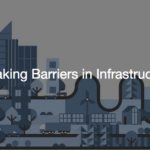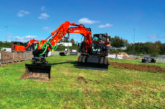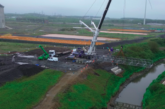Topcon Positioning GB and the Institution of Civil Engineers (ICE) have today launched a new whitepaper which explores the barriers to adopting new technology and working processes in the industry.
Breaking barriers
The paper, commissioned to understand opinions on the industry’s current state of digitalisation and productivity, identified cost and company culture as the greatest barriers to adopting new technology and working practices, with 27% and 22% of respondents suggesting these respectively.
The findings, based on opinions and feedback from over 200 ICE members surveyed at random in Autumn 2018, also suggest that eight in 10 believe that the skills shortage is the main challenge for the future of the industry. Technology’s role in solving the skills challenge is contested between junior staff and leadership, with over half (58%) of junior staff believing that the skills gap could be overcome by adopting new technology. However, less than a quarter (23%) of senior professionals believe technology could be a key solution.
Dave Bennett, managing director at Topcon Positioning GB, said: “This report demonstrates the need to bring about change in the way we learn and develop as a profession. It’s something I’m really passionate about instilling within our business at Topcon, ensuring as a technology provider we’re supporting the industry with the skills needed to understand and adopt new technology and the required associated ways of working – from finding the next generation of civil engineers to engaging with the most senior levels of the industry.
“The findings gave a snapshot into the state of the industry, and it would seem that our two biggest barriers – cost and culture – go hand in hand. We must shift from the short-term thinking of project-by-project profit and consider the wider benefits in terms of productivity and efficiency that these investments will bring in the long term.”
Learning from success stories
The whitepaper includes contributions from a cross-section of industry professionals, from graduates to senior engineers. These contributions provide an insight into operations at some of the industry’s leading businesses, such as Balfour Beatty, Thames Tideway and the Skanska, Balfour Beatty and MWH Treatment Joint Venture (SMB), discussing best practice to drive the industry to being more productive and efficient by adopting new technology and working practices.
Nathan Baker, ICE Director of Engineering Knowledge, said: “We know that digital innovation can increase the infrastructure sector’s productivity and help deliver increased economic growth and better social outcomes. ICE is supporting its members by sharing knowledge and promoting best practice. But professionals across the industry are still encountering barriers to change, risking the opportunity that the fourth industrial revolution represents. With this research, we’re inviting the industry to reflect on the findings and help us drive debate and action to support true transformation.”
To read the whitepaper in full, visit: www.topconpositioning.com/gb/tpgb-whitepaper-download









